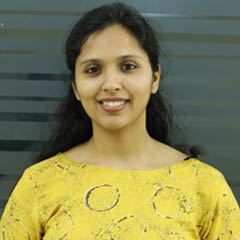I feel like using the term global citizen to describe myself: Aparna Mulberry

Mail This Article
Viral video content creator and English teacher Aparna Mulberry is all set to make her debut in Mollywood with 'Monica Oru AI Story.' The film is touted as India's first artificial intelligence film and is directed by E M Ashraf and produced by Mansoor Palloor. Aparna who is a US native but spent a lot of time in Kerala said she is excited about her Malayalam debut, adding she decided to do the film because she could relate with the character.
“I had received a few offers from the film industry in the past but I could not relate to those movies or characters. In 'Monica: Oru AI Story', I play an AI character, whose personality is similar to mine. The film revolves around a young boy who does not find any comfort at home. So, he is forced to turn to external stimuli for acknowledgment. My character offers a lot of support to him and helps build his confidence. I could connect with that role because I am a teacher myself,” she said.
The film also seems to address a relevant issue regarding mobile phone addiction...
The film is an eye-opener to parents, grandparents and families. It also addresses the future of AI, which is already our reality. Through my character, we get an understanding of how humans can expand their intelligence through AI.
In life too, you seem to have a way around kids
I love kids and hope to have a bunch of kids some day. I always wanted to adopt children since there are so many abandoned children out there. This motherly instinct comes naturally to me.
You spoke about becoming a mother. How do you see the concept of families here and in the West?
The US is basically an individualistic society. At 18, you just want to leave your home. I did the same. I did volunteer activities. When you become grandparents, you need to make appointments to spend time with your grandchildren. The society is not community based like India, where family concept is community based. I grew up in Amritapuri Ashram in Kollam. I had several aunties, uncles, grandparents around me always. I recall my childhood with pride. I envisage such a community setting for raising a child.
It's interesting to watch you teach Malayalis better their English. How did this all begin?
I have been teaching English for the past 12 years. I initially taught English to Chinese children online. I picked up the technique of teaching English as a second language. I got the opportunity to teach in Kerala during Covid. It was my way of returning back to society, because Kerala taught me Malayalam.
Did you see yourself doing films as a career?
I never even saw myself creating content. I started a page 'Inverted Coconut' on social media when I was forced to stay away from India during Covid. The Indian government had cancelled all foreign visas and I could not return to see my mother. Also, since Malayalam is an incredibly tough language, I wanted a means to continue speaking in Malayalam. This was how I started 'Inverted Coconut'. One thing led to another and my page became viral because people liked to watch me speak in Malayalam.
A US native or Malayali? How do you identify yourself?
I feel like using the term global citizen. I was born in the US, which is my father's native place while my mother is from Chile. I was brought to Kerala when I was three and stayed here till the age of 15. I then spent 12 years in the US pursuing my further studies and then moved to Europe and then France. Now, I am back here. Initially, I felt I never belonged anywhere. In India, I felt more American. While I was in the US, I felt more Indian. I had an identity crisis, but that changed when I realised I had this superpower and ability to fit everywhere. I have been able to adjust to various cultures. It comes from my parents. They have travelled a lot. They met in India, so I believed I had Indian roots long before I was born.


